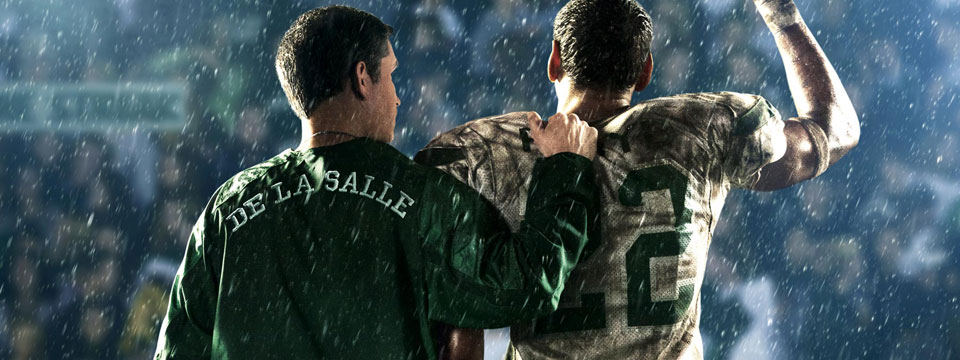
by Chris Doyle | Nov 26, 2014

Helga Esteb / Shutterstock.com
I watched the recent season of “Dancing With The Stars.” If you want to take away my “man card” for doing such, feel free. Considering how busy the schedules both my wife and I have, the time we can spend together, even if it involves watching meaningless entertainment, I consider priceless.
This season of DWTS featured Sadie Robertson of “Duck Dynasty” fame. I’ve been known on Word Slingers to share my commentary on the reality TV show that you can read here and here.
Sadie is the 17-year-old daughter of Willie Robertson, lead character in “Duck Dynasty.” Those who have watched the show regularly have watched her grow up into a very mature Christian young lady. Her faith definitely was shown throughout DWTS.
She reminded me of Queen Esther. Placed in a rather secular environment with no expectations of influence for God, Sadie made a strong presence. The show allowed her to express her faith. They emphasized how she would pray with her family and her dancing partner before every show. They did not make light of her wishes to be shown modestly and with a sense of purity.
*SPOILER* Consider the fact that Sadie had no dancing background nor professional training prior to the show, and the girl finished as the runner-up. She may have made the greatest impact of any non-winner in the show’s 10-year history.
I hope this is the beginning for her. I know she has been involved in other Christian ministries, and this experience for her, God willing, could expand her mission opportunities. The list is short for godly role models for teenage girls. And when one comes around, the star seems to intentionally damage her reputation. May this never happen for Sadie.
God bless you, Sadie! I know your strong family roots and your consistency to show kindness will help you be faithful in sharing the Gospel to many who need to hear its powerful message.
“Who knows, perhaps you have come to the kingdom for such a time as this.” Esther 4:14b

by Chris Doyle | Nov 4, 2014
I had the opportunity to attend the Ethics and Religious Liberty Commission (ERLC) national conference last week in Nashville, Tenn. This was a powerful event that was greeted with much interest.
It was reported that more than 1,300 attendees were at the conference, but from the “two-eye theory,” I would guess there had to be at least 2,000 people in that big ballroom at the Opryland Conference Center (which has to be the largest building on earth, and it definitely felt like it with all the walking I did).
This conference was needed, and more church leaders should attend similar meetings, ones that are conducted properly. A requirement for such meetings is a willingness to learn with humility and without preconceived notions about the Lesbian, Gay, Bisexual and Transgender (LGBT) community.
One of the best comments from the conference was made in the first session. Al Mohler, president of Southern Seminary, kicked off the conference, and in his opening talk he said, “We know what the Bible says, but we want to know what do we do now? It’s going to take an awful lot of Christian thinking. It’s going to take an awful lot of prayer. It’s going to take a lot of agonizing conversations – the kind of conversations that take place in the middle of an emergency.”
For the past couple of years, evangelical churches have been involved in making some critical decisions that church leaders have not experienced since the Apostle Paul confronted the Church in Corinth. And this is happening all over the place – multiple states and even in the U.K. – and will only continue.
Not only does this crisis involve the influence of the LGBT community and its supporters, it involves the state of marriage. Churches have failed in emphasizing the importance of the institution of marriage. And this institution doesn’t just involve two people who are joined in holy matrimony. It involves the whole church family, even those who may be single temporarily or for a lifetime. I’ll explain further in this piece.
I wish I could share everything that I took from the conference, but I’m sure you would stop reading if I did. Instead, I will offer three things I learned for you to contemplate:
- We are not prepared.
Churches abroad do not know how to handle these societal changes. Many are panicking and demonstrating a militant response. Some are conceding with a so-called “third way” option.
Yet other churches want to do what is right, but there may not be one exact process for how to observe obedience to the truth while also demonstrating grace. What I mean by this is some churches have a greater exposure to the mission field of the LGBT community while others have a few who struggle with same-sex attraction and just need someone to walk with them through this dark valley.
No matter the level of ministry, churches need to remove the mentality of “Us vs. Them.” This means overcoming the characteristics of homophobia, no more sharing of gay jokes, realizing that sexual orientation is to be taken seriously and doing more than just studying the six Bible passages that mention homosexuality.
Russell Moore, ERLC president, summed it up best at last week’s conference when he said, “We have to be reminded that we are not ministers of condemnation. We are ambassadors of reconciliation.”
- How you view marriage affects how you view homosexuality.
This second point is easier for some to accept more than others, but marriage is at a confusing state today. This isn’t just about the current debate over “same-sex” marriage. This confusion involves how the church emphasizes marriage.
I’ve heard on more than one occasion somebody say “Well ‘same-sex’ marriage doesn’t affect my marriage,” and then conclude it is best to be passive about the issue. This is just one example of flawed perspectives.
As I said, marriage does not just involve a bride and a groom. Without even discussing procreation as a major distinction point between marriage and ‘same-sex’ marriage, we can broaden the topic even more. Marriage is an amazing gift from God, and all wedding participants and observers should be reminded what marriage represents.
“The purpose of marriage is for the display of the Gospel and a demonstration of the glory of our God,” said David Platt, new president of the Southern Baptist International Mission Board. Unfortunately, today’s churches have lost focus of the importance of marriage, and this affects how they view homosexuality.
It is too common of a perception that disagreeing with the current acceptance of ‘same-sex’ marriage is passing judgment on those who participate. Those who believe this apparently have a low perspective of marriage. The church is at fault for this way of thinking.
Those who are single, divorced, widowed are not always given full consideration and recognition when the church celebrates marriage. This should not continue. Whether married or single, all people can have an appreciation of what marriage represents, and every wedding ceremony should include an emphasis of the Gospel. If more churches would find ways to present the Gospel at wedding ceremonies, perhaps this could begin a positive change, not only in the divorce rate but also in a greater way to value marriage against all cultural attacks.
- Churches need more integration.
Churches are great at providing specialized Bible study classes and functions. Young adults, median adults and senior adults all have their own groups. Some of this life-stage sorting can be helpful, but too much can be damaging, even to the point of extinction.
I am convinced that churches of today, regardless of size, that make a greater emphasis to involve more mingling among generations will have a greater chance to exist tomorrow. To be more specific, millennials need more encouragement to make church a priority in life. If they make church a priority, then marriage becomes a priority. Also, it means the number of future church leaders increases.
Please don’t misunderstand. I’m not promoting a match-making strategy. If a single adult were to meet their spouse at church, then I say “Great!” Speaking from experience, I know very well this can happen. But the blessings of a church family are more than possibly finding one’s future mate. For those who may be single for a season or a lifetime, being actively involved with a church family can help them and help the church.
“We now live in a culture where more people are single than are not single,” said Trevin Wax, managing editor of The Gospel Network. “The church has been slow to wrestle with that reality because that is not what we were prepared for. If the culture reveals that single is the norm not the exception, what will it take to bring them into the congregation? Ministry can’t be ministering to singles but alongside singles. There needs to be a better integration.”
And with integration, this means offering opportunities that do not involve life-stage divisions. Have more mentoring opportunities at church of experienced adults connecting with college students and young professionals.
My church recently created a college adoption ministry, allowing for families to “adopt” a college student to be a part of family functions. This is a great way to not only allow a college student to have a home-cooked meal and a place to do laundry but also provide the student a greater exposure to the importance of church community.
Churches have a long road ahead of dealing with the cultural issues of homosexuality and the state of marriage, but the ones that choose community over condemnation and reconciliation over rejection will be miles ahead.

by Chris Doyle | Oct 6, 2014
I’m a sucker for commercials that feature dogs, like the one Subaru did a few years ago with a chocolate lab. Images of the loyal pet aging as the owner continues through life convey the message that Subaru is as reliable as man’s best friend.
I noticed Budweiser has a similar commercial, showing a yellow lab come of age. Watching man and his dog share fun moments in life, I’m all for these settings.
But the Bud commercial takes a different angle. The guy is shown leaving the house with friends, and the lab is left all alone. Patiently he waits for his owner to return, showing different shots of him looking out the window, lying on the floor, sounds of a brief whimper, hearing a car drive by.
The owner finally returns the next day. “Hey, I’m sorry. I decided I shouldn’t drive home last night.” The dog is overjoyed as he and owner are together again.
Did you get the message? Budweiser wants us to believe the dog owner is to be admired for deciding not to drive home last night because he got drunk and didn’t want to be driving under the influence.
Society today wants to give this guy a Medal of Honor, and Budweiser couldn’t be happier because now our hero can get totally wasted from drinking their beer. They make money off of him and look like humanitarians because they encouraged him not to drive after getting sauced from their product.
Would you believe it was more than 30 years ago when Anheuser-Busch came out with the slogan “Know When to Say When”? That statement made a totally different appeal than what the message is today. They tried to encourage moderate drinking, back in the day. Now, it’s “go ahead and get hammered, just don’t drive.”
I’m concerned because drunk driving should not be the only problem that needs to be addressed. Drunkenness entirely is a problem. A serious problem.
Please don’t misunderstand the argument I’m making here. This is totally separate from the “Should Christians Drink” lightening rod debate. I have my own views on that topic, but that is not what is being emphasized in this blog. If you respond with the typical “Jesus turned water into wine,” “Gluttony is also a problem. Why don’t you point that out too?” responses, you are missing my point.
However you view drinking alcohol, please know the Bible is clear about drunkenness. Passages such as Eph. 5:18; Gal. 5:21; Prov. 20:1; I Cor. 6:10; Prov. 23:20-21 are just a few examples. There’s more than 30 I could list, so this is not a gray issue.
Take in consideration how excessive drinking has affected many marriages. A few years ago, I helped lead a Divorce Care class. There were seven who showed up that first night. Five of them shared alcoholism had a part in wrecking their marriage. This may be a small sample, but I’m sure it’s a solid reflection of society.
Another aspect where excessive drinking is a concern, think about how it could play a part in domestic violence. That’s the latest big topic, and we all are aware how much domestic violence is a problem. Do you think everybody who participates in such acts is sober?
As much as Budweiser wants us to stand up and applaud their dog commercial for encouraging the owner not to drive while intoxicated, this message falls short of the greater issue.
But more than I want to criticize Budweiser, I want to encourage you, my fellow Christian friend, please don’t fall victim to this misperception. Maybe we don’t agree about whether it’s right or wrong to drink alcohol, but drinking excessively has no leeway.
“Be sober! Be on the alert! Your adversary the Devil is prowling around like a roaring lion, looking for anyone he can devour. Resist him, firm in the faith knowing that the same sufferings are being experienced by your brothers in the world” (I Pet. 5:8-9).

by Chris Doyle | Sep 11, 2014
The last few weeks have been filled with reports about football players conducting themselves inappropriately. On the national level, the most popular incident involves Ray Rice, running back for the Baltimore Ravens. Here in Oklahoma, Joe Mixon, a high school All-American running back who came to play at the University of Oklahoma, is under similar scrutiny for committing a similar offense – punching a woman.
Rice’s incident became a hot topic again because earlier this week, the video of him punching his then-fiancé-now-wife became available for the public to view. The public’s reaction caused Rice’s initial penalty of a two-game suspension to greatly increase to no longer being a member of the Baltimore Ravens and suspended indefinitely by the NFL, possibly to never play again.
I know the NFL is in hot water because of how the league has handled the Rice incident. As much of a mess that is, I’m not going to directly address the NFL’s problems in this blog.
Instead, here are two aspects I have learned and believe Christians need to consider as a result of both ordeals.
- Everybody is vulnerable
There can be no justification for what these men have done to these women. At the same time, what I have realized is both Rice and Mixon were considered fine, upstanding men before they committed these horrible acts.
Rice has been a spokesperson for different NFL charities. He was considered a role model for young people. Two years ago, he hosted a new initiative in his hometown of New Rochelle, N.Y. called “A Ray of Hope: A Pro-Kindness, Anti-Bullying, Teen Prevention Outreach.”
One of Mixon’s high school coaches said, “He’s not like that,” claiming hitting a woman is beyond something Mixon would do.
They had spotless reputations. Before these occurrences, neither one committed an illegal act, from what can be told. I don’t claim to know everything about these men, but before these incidences, they were wearing proverbial white hats.
All it takes is one situation to ruin a reputation. For them, it took losing their temper and committing an atrocious deed. Neither appear premeditated. From what the evidence has revealed, Rice was arguing with his wife; Mixon was confronted by a co-ed. With a quick and hopefully regrettable reaction by both men, their hats turned black.
So what does this mean? But for the grace of God, there go I. Taking stock of certain thoughts I have had over my lifetime, there is no telling what heinous crimes I may have committed had my thoughts come to fruition.
- Pray don’t pounce
All those involved should be blanketed with prayer. This includes Mr. and Mrs. Rice and their family. This includes Joe Mixon and the young lady he hit.
I pray for reconciliation in both cases. “Reconciliation” is one of my favorite words. Another one of my favorites is “restoration.” Would you like to see the Gospel in action? Reconciliation and restoration occurring in these extremely too popular stories could be snapshots of what the Gospel can do.
The Rices appear to want to reconcile and move on with their lives. The sooner they are out of the limelight and surrounded by a good support group, especially Christian mentors, the better the chance it could happen.
For Joe Mixon, I’m glad to hear the reports of him still enrolled at OU. I also hope he can follow a similar path of Ryan Broyles, former OU standout, who also had a checkered beginning in college.
I would not compare Broyles’ crime of stealing to what Mixon did, but Broyles did clear his reputation. And from what I have been told, though I don’t have concreate evidence, former OU quarterback Landry Jones led Broyles to Christ and helped disciple him.
I believe successful endings can happen for Rice and Mixon. Praying for both is a benefit, and pouncing on them every time they are “watering hole” topics is a detriment.
So how are your actions helping the cause?

by Chris Doyle | Aug 28, 2014
Football season is upon us. This weekend, many will be enjoying the gridiron action live and through multiple television broadcasts.
For many years, I have commemorated the start of football season by watching one of my all-time favorite movies, Rudy. However, this year, I chose a different flick.
When the Game Stands Tall stars Jim Caviezel, known for portraying Jesus in The Passion of the Christ and recent TV fame in Person of Interest on CBS. Caviezel plays Coach Bob Ladouceur who leads De Le Salle High School’s football team to a 151-game winning streak, the longest of any successful stint in organized sports.
Inspired by a true story, the film’s plot starts to thicken when the team ends the streak and different players face adversities, some as a result of the monumental loss, but others due to off-field misfortunes.
Ladouceur is always the strong leader, through the good times and the bad. He has a few memorable lines that help inspire the young men under his charge.
My favorite parts of the film are the games. I’m a sucker for intense game scenarios, and this movie has some good ones. There’s also a moment that reminded me of Hoosiers, when Ollie, Hickory’s smallest player, hits the winning free throws granny-style. A similar unexpected hero appears late in When the Game.
So many character-building messages appear throughout the movie. It promotes abstinence, good sportsmanship, commitment, family and dignity.
When the Game does have some slow moments with heavy dialogue. Some critics claim the film is “too cliché’.” Personally, with all the immorality and profanity saturating the majority of today’s movies, I happily welcome a “squeaky clean” show.
The movie does feature a shooting, but I didn’t see much else to grant the movie’s PG-rating. This has to be one of the cleanest movies released in years and definitely should be heralded by those who support faith-based films.
Photo credit: Sony Pictures





